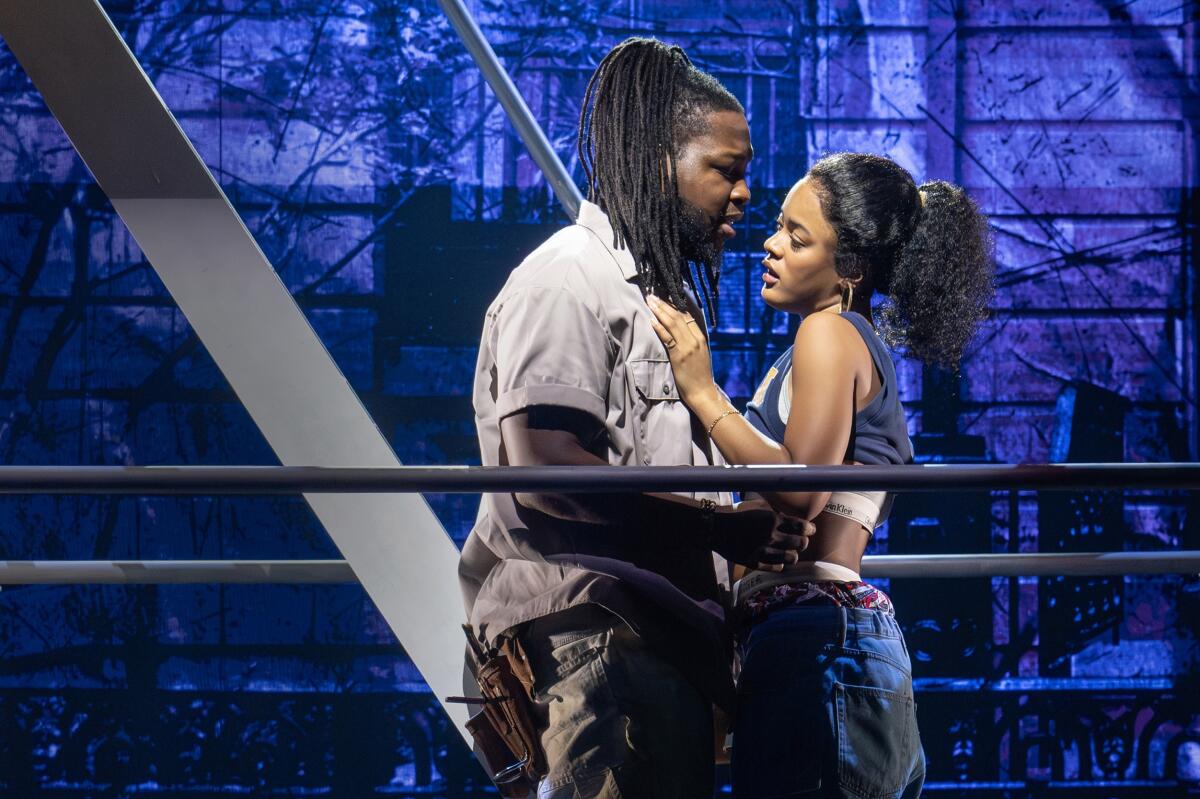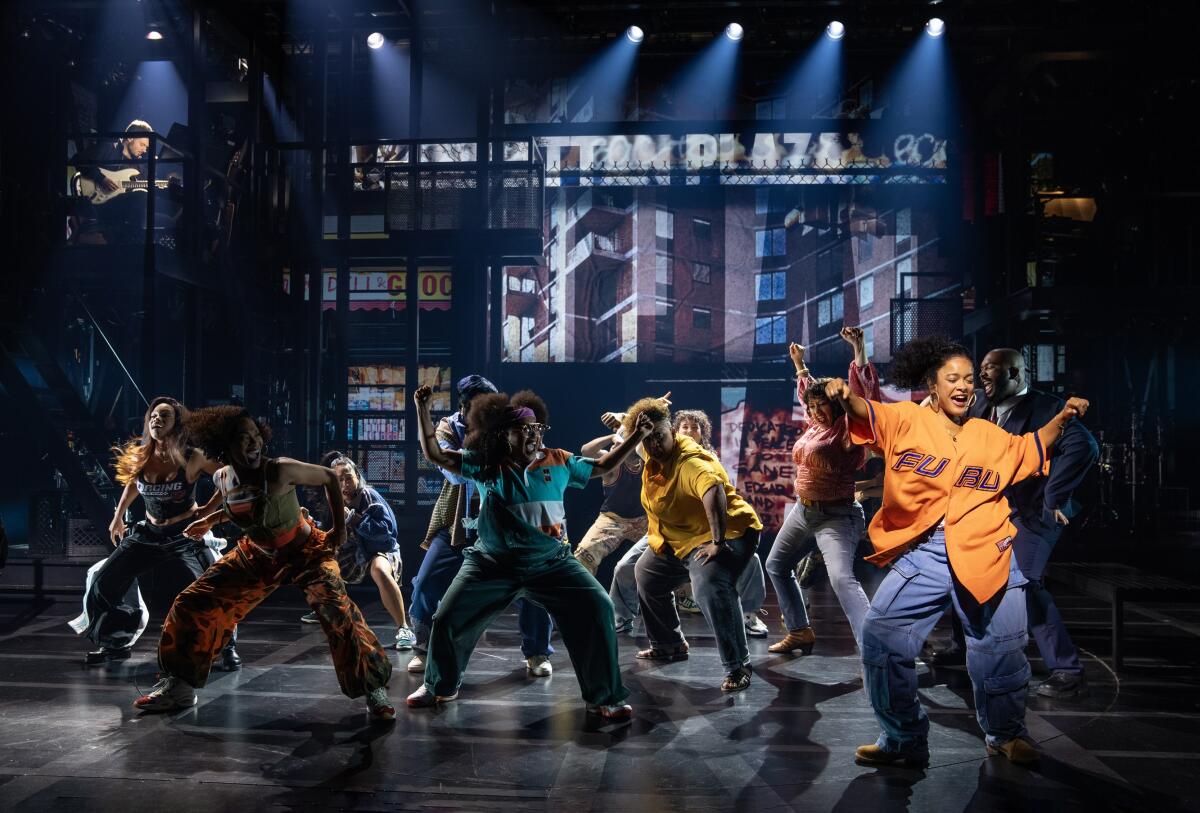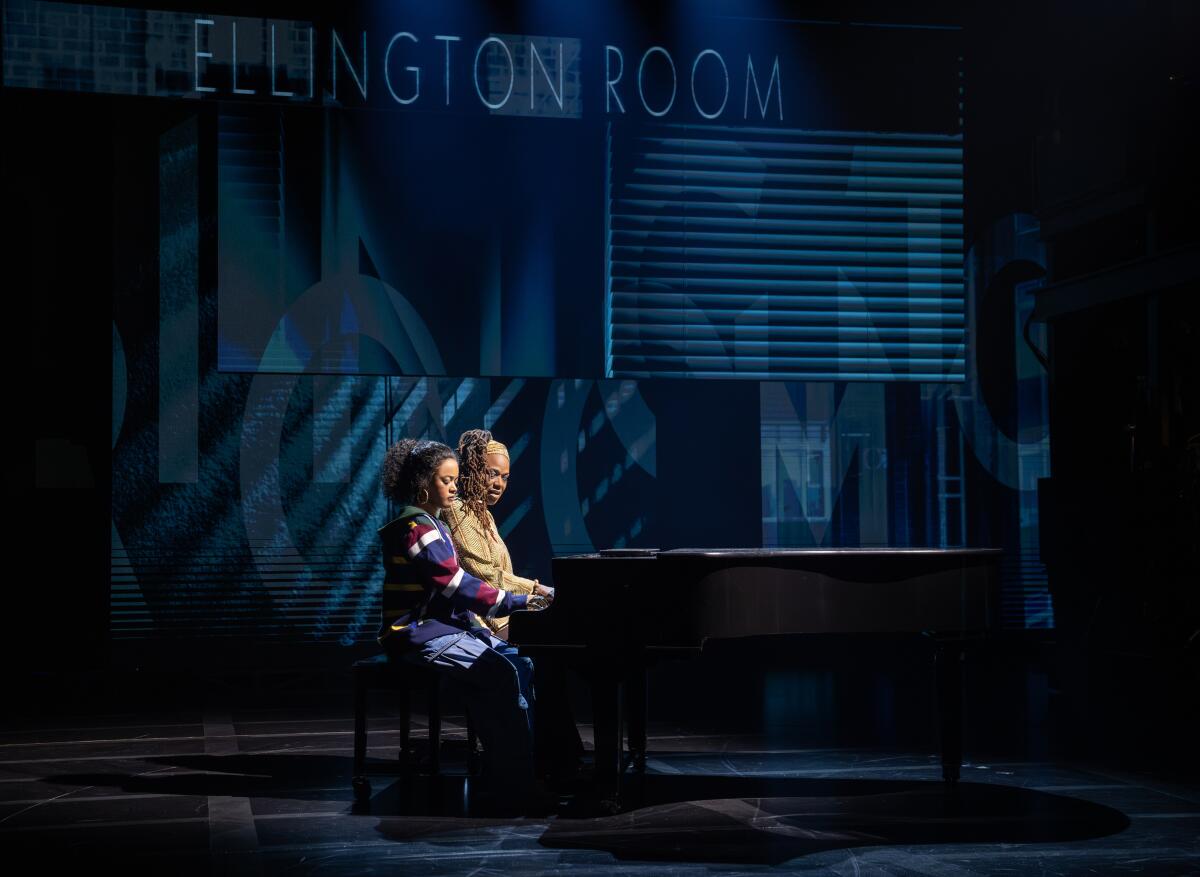Not another jukebox musical, ‘Hell’s Kitchen’ artfully reimagines Alicia Keys’ songs

- Share via
Forgive me, but I’m still a bit giddy from the musical high of “Hell’s Kitchen,” the new semi-autobiographical musical by singer-songwriter Alicia Keys that’s having its world premiere at the Public Theater in a stylishly kinetic production directed by Michael Greif.
The show, which features a book by playwright Kristoffer Diaz (a Pulitzer Prize finalist for “The Elaborate Entrance of Chad Deity”), soars whenever the gifted cast is singing one of Keys’ brilliantly reinterpreted hits.
The songs don’t feel plunked down the way so many jukebox musicals do. Instead they are artfully reimagined, their rhythms rediscovered in jazz, their lyrics redirected into new contexts. The performers — singers of extraordinary talent who approach their musical roles as actors — make the numbers their own, which is to say their characters’ own.
I have my share of Keys’ music in my digital library, but I wouldn’t describe myself as a zealous fan. Appreciative, yes, but from a distance. Maybe that’s why I was surprised by how rapturously I fell under the musical’s spell. Usually at a jukebox musical, I’m ticking off the hits like a clerk in a hardware story carrying a clipboard. Here, I never wanted the songs to end.

The book is another story. “Hell’s Kitchen” doesn’t have, like so many new musicals, an Act Two problem. It has a stakes problem that’s evident throughout. Diaz, perhaps not wanting to intrude into areas that are so personal to Keys, doesn’t dig as relentlessly into the complexity of the material. There’s a more ruthlessly honest version of this coming-of-age story waiting to be told. Right now, the genius of the show is located in Keys’ score.
“Hell’s Kitchen” has been informally dubbed the “Manhattan Plaza musical” by New Yorkers familiar with the federally subsidized residential complex on the western edge of the theater district where the musical is set. The neighborhood’s name sounds rough and tumble — and when Keys was growing up in the 1990s it was grittier. But Manhattan Plaza, which provides affordable housing to artists, is a magical kingdom.
Riding the elevator was a musical experience for the young Keys, as the sounds of musicians practicing, singers harmonizing and dancers trying out new moves wafted from every floor. For a precocious kid with prodigious musical talent waiting to cultivated, it was an ideal place to grow up, even if it was smack in the middle of all the dangerous allures of a big city — and thus a source of constant worry for an overprotective single mother wanting to keep her daughter from repeating her own mistakes.
Ali, Keys’ surrogate, is played by Maleah Joi Moon, who’s making a staggering professional debut. It’s an astonishing performance, and not only because Moon sings with luster and power that must have made Keys swoon. Portraying the 17-year-old Ali with a mix of swagger, defiance and vulnerability, Moon transcends impersonation to provide a soul-print of an artist as a young woman.
Shoshana Bean plays Ali’s mother, Jersey, a former actor who’s holding down two jobs while keeping a strict eye on her daughter. Broadway has long known that Bean possesses one of the great musical theater voices of her generation. (She received a Tony and a Grammy nomination for “Mr. Saturday Night” and has recorded six solo albums.) But this is the role she’s been waiting for — and she delivers in a way that renders almost irrelevant the script’s shortcomings.
Jersey knows that Ali is fascinated by the music of the streets. The more she forbids her daughter from leaving the apartment in the evening when she’s at work, the more Ali is compelled to disobey her. Ray (Chad Carstarphen), the doorman, has been charged with keeping Ali safe. But New York beckons, and she’s too full of fervor not to slip past his guard.
A group of bucket drummers parked outside Manhattan Plaza captures Ali’s attention. One drummer in particular, Knuck (Chris Lee), who is several years older than Ali and reluctant to get involved with a teenager, becomes the object of Ali’s affection. Her persistence eventually wins him over, but only until her mother catches them getting hot and heavy on her couch.
Diaz deploys the classic storyline of young lovers blocked by a parent as the central structure of the book. The romance’s slow start is distilled in “You Don’t Know My Name.” “Girl on Fire” victoriously erupts after Ali gets what she’s been dreaming of. A gorgeous duet of “Like You’ll Never See Me Again” with Knuck in the second act signals the loss that always shadows first love.

The intensity of Ali’s inner life is earned through the music. (Music supervisor Adam Blackstone collaborated with Keys on the arrangements and Tom Kitt, who worked on the orchestrations with Keys, served as music consultant on the brilliant score, which contains new music along with soulful treasures.)
Camille A. Brown’s choreography interprets the whiplash emotional changes Ali is going through via ensemble numbers that can get a little corny when they over-illustrate. But the conviction of the fierce dancers is never in doubt and the energy on the stage is propulsive throughout. (Robert Brill’s scenic design creates a postmodern landscape that’s part cityscape, part dance floor.).
Dramatically, the conflict between Ali and her mother can seem pedestrian and not worth all the theatrical hubbub. There’s more to explore in Ali’s bi-racial identity. Raised by a white mother, Ali longs to have a steadier relationship with her Black father, Davis (a soul-stirring Brandon Victor Dixon), a musician who’s frequently on the road and conveniently unable to live up to promises.
The book captures the way loved ones who mean well can continually disappoint. Jersey tries to protect her daughter from the pain of a father who awakens expectations only to leave them unfulfilled. But the family psychology is most deeply revealed in the music.
Davis coaxing his daughter to join him in a sublime version of “If I Ain’t Got You” and Jersey consoling her daughter in a duet of “No One” are two of the most emotionally affecting numbers in the show. The songs are reinterpreted in such surprising ways, but it is the sheer beauty of the singing that grabs hold of our hearts and lets us understand something about the primal wound of love.
Another significant storyline involves Ali’s growth as an artist under the stern, loving mentorship of Miss Liza Jane (Kecia Lewis), a fellow Manhattan Plaza resident whose classical piano sessions in a rehearsal room in the building lures Ali into her orbit. As a character, Miss Liza Jane combines the hauteur of opera diva Jessye Norman and the sermonizing wisdom of Maya Angelou.
The teacher-student relationship could be more subtly delineated. (Lewis’ gravity is most persuasive when she’s singing.) But complicated identity issues are raised. Miss Liza Jane is determined to connect Ali with the musical legacy of her Black “ancestors.” Ali’s mother, thrust into the role of bad cop, feels threatened by Ali’s growing closeness to her teacher. The story takes a somber turn, but there’s more to mine in these dynamics.
The faults of the book are obvious, but I found myself succumbing to the overwhelming emotion of Ali’s story, sentimentality be damned. “Hell’s Kitchen” doesn’t dramatize the rise of an R&B phenomenon. (Only the character’s early evolution as a musician is sketched.) What the show chronicles instead is the concrete jungle from which an artist’s dreams arose.
“Empire State of Mind” is a fitting final number, and it succeeds in doing what the Kander and Ebb theme song for “New York, New York” attempted to do in the musical adaptation that premiered on Broadway last spring — lift an audience into a higher appreciation of how a city can inspire creativity, provoke it even, as an act of ecstatic survival.
“Hell’s Kitchen” made a believer of this jukebox musical denier. Reinvention is the key to Keys’ spectacular success. Let’s hope Broadway is taking note.
More to Read
The biggest entertainment stories
Get our big stories about Hollywood, film, television, music, arts, culture and more right in your inbox as soon as they publish.
You may occasionally receive promotional content from the Los Angeles Times.











